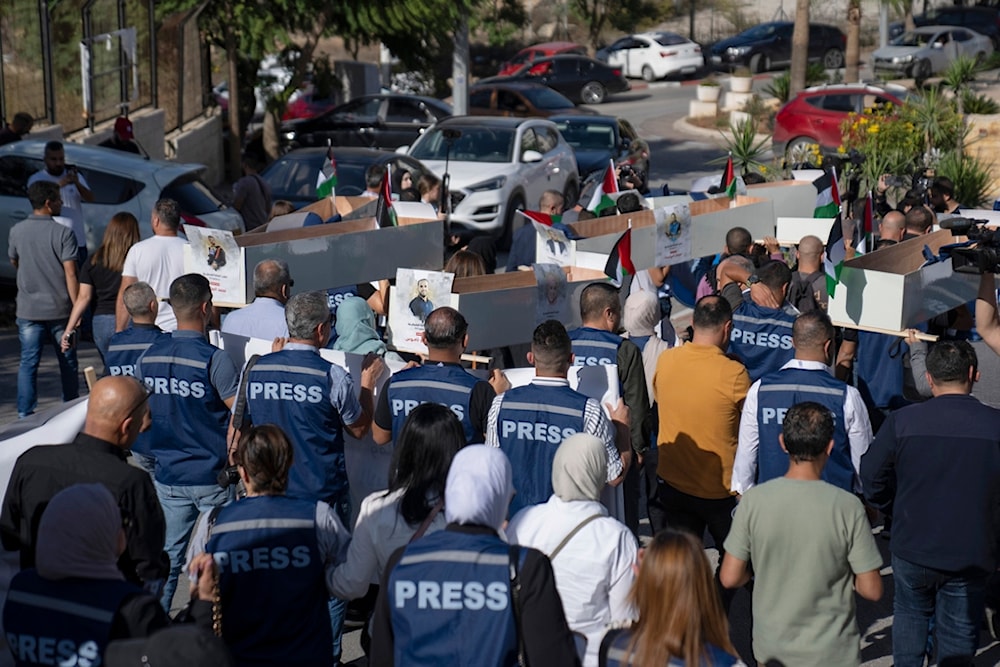'Israel' controls media, does not allow int'l journalists into Gaza
International journalists in Palestine have been expressing their irritation over the ban on entering Gaza, which renders their job impossible.
-

Palestinian journalists carry mock coffins of Palestinian journalists who were killed during the current war in Gaza during a symbolic funeral toward a United Nations office, in the West Bank city of Ramallah, Tuesday, Nov. 7, 2023. (AP)
International journalists in Palestine have been expressing their irritation over the ban on entering Gaza, which renders their job impossible, as reporting news live from the ground has become unfeasible, The Guardian has reported.
The "Erez" crossing between occupied Palestinian territories and Gaza and the Rafah crossing between Egypt and Gaza have both been closed since October 7 by "Israel" and the Egyptian authorities respectively, making it impossible for journalists to enter the Strip and document the genocide up close.
It was reported by The Guardian that an Israeli organization that represents international journalists, the Foreign Press Association (FPA), has undertaken legal operations to allow journalists into Gaza after their request to the IOF was blatantly neglected.
The global populace has been relying on Palestinian journalists inside Gaza for documentation and updates, civilian testimonies through social media, and humanitarian aid agencies' reports, such as the UN. These parties have all faced tremendous challenges as a result of the relentless Israeli bombardment, online isolation caused by the deliberate shutting down of internet services by "Israel", and the deliberate targeting of journalists or Palestinians that have been actively exposing the occupation's crimes.
International journalists who are located inside of Gaza though have encountered journalistic restrictions imposed by the IOF, who insist on reviewing their work before they're published. Other than that, due to the mass bombing strategy "Israel" has embarked on, press agencies have shown reluctance to send their journalists into Gaza, as the risk of death has only been increasing.
“The FPA is aware of the unique security challenges posed by the current war. Nonetheless, Israel has always enabled access to Gaza during and after previous rounds of fighting. It also is legally obligated, under a previous supreme court ruling,” the FPA said in a statement. They also reminded the IOF of their commitment to the freedom of the press, which goes well beyond the opportunities they have allowed foreign journalists to take since the start of the war.
The head of the Israeli Foreign Press Department, Ron Paz, has stated that no one has been allowed through the "Erez" crossing since October 7, from diplomats to civilian workers, and that the only way in is through the Rafah crossing, which is under complete Egyptian control. He proceeded to rid himself of the decision of disallowing the press into Gaza as it is a "matter of policy beyond his realm."
Read more: Letter by over 750 journalists condemns Western coverage of 'Israel'
Statements by journalists
Testimonies from journalists who have been reporting the situation in Palestine, even before the war, have been shared. Jeremy Bowen, who works for BBC, stated that not being able to cover directly from the ground distorts the reality of what is happening, stressing, however, that going into Gaza would be accompanied by a sense of fear, as all journalists have felt. He added that restricting access to journalists is a power play to control what the media sees versus what is being executed, confirming that this is more within "Israel's" ability because of its control of access points to Gaza.
Secunder Kermani, a foreign correspondent for Channel 4, said that despite having Palestinian journalists document, very profoundly, what is happening in Gaza, it is still "highly frustrating" not being able to cover the events in Gaza, describing it as being of utmost eminence, as the war in Gaza relays colossal historic repercussions.
An anonymous journalist described the difficulty of gathering and sharing news from Gaza, as phone and internet services keep getting shut down. He then highlighted his skepticism toward journalists charging into Gaza if the borders were open, saying once they are in, they "cannot retreat from the frontlines" because nowhere is safe.
The Guardian's Jamie Wilson echoed the warnings of danger but said that media organizations should be given the prospect of contemplating their options instead of having "Israel" decide for them by cutting access to the Strip.
The US censors Israeli crimes
Before the ceasefire, US President Joe Biden's administration feared that a temporary pause to the aggression on Gaza would allow journalists to access the Strip and take pictures and draft reports, uncovering Israeli crimes and destruction that the aggression has caused, Politico reported, citing US officials.
The emerging images and coverage could "turn the public opinion on Israel," the newspaper said.
At least 86 Palestinian journalists have been killed in the ongoing Israeli military campaign in the Gaza Strip since Oct. 7, the government media office said Monday.
Head of the Freedoms Committee at the Palestinian Journalists Syndicate, Mohammad al-Laham, explained that "the difficulty of monitoring and documenting remains a significant obstacle due to the ongoing and intense nature of the Israeli aggression."
The occupation forces have targeted numerous correspondents and journalists in both Gaza and Lebanon during the ongoing Israeli aggression on the two fronts.
In late November, an Israeli-targeted drone strike in southern Lebanon led to the martyrdom of Al Mayadeen's reporter Farah Omar and cameraman Rabih Me'mari, along with their civilian associate Hussein Akil.
Additionally, on October 13, Israeli occupation forces directly targeted a group of journalists in the vicinity of the town of Alma al-Shaab, while they were covering the situation on the border between Lebanon and occupied Palestine, resulting in the martyrdom of Reuters photographer Issam Abdallah and the injury of several others.
Read more: Israeli occupation assassinates journalist Amal Zohd, family in Gaza

 5 Min Read
5 Min Read








